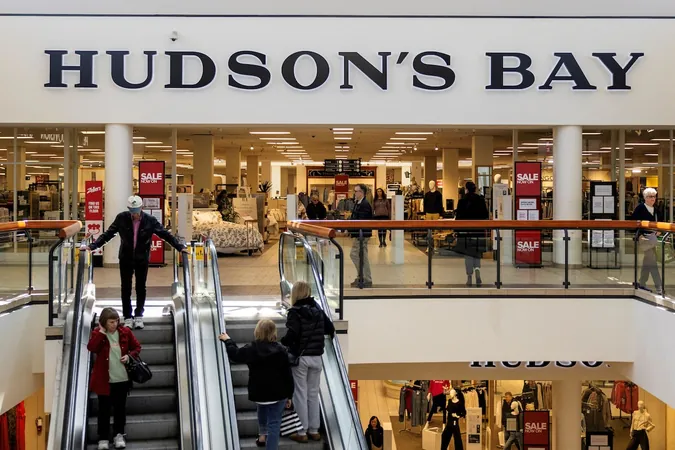
Are Tourists Abandoning the U.S.? The Potential Economic Fallout Awaits!
2025-03-28
Author: Emma
In a world where travel fuels economies and connects cultures, the United States has historically been a top destination for tourists. Iconic cities like San Francisco, New York, and Chicago, along with natural wonders such as Yosemite National Park, have lured in approximately 66.5 million visitors in 2023 alone. Experts had anticipated an even stronger influx in 2024. However, ominous clouds are gathering on the horizon, signaling that things may not proceed as smoothly.
The political landscape in the U.S. has shifted dramatically with the anticipated reelection of Donald Trump, raising concerns about how new foreign diplomacy strategies and cultural dynamics may repel international visitors. Recent analysis from Tourism Economics predicts a staggering 5.5% decline in inbound travel for 2024—another blow considering a previous forecast projected nearly 9% growth. Should tariff battles and trade tensions escalate, it could lead to an estimated annual reduction of $18 billion in tourism revenue by 2025, jeopardizing countless jobs in the hospitality sector.
Evidence of this trend is emerging, particularly from Canada, which is the largest source of tourists to the U.S. Following Trump's announcement of significant tariffs on Canadian goods, many Canadians are opting to stay home—reportedly leading to a drop of up to 45% in cross-border travel on certain days. Air Canada, taking heed of this shift, plans to cut flights to popular U.S. destinations like Las Vegas.
A recent poll by Canadian market researcher Leger reveals that a striking 36% of Canadians have shelved their travel plans to the United States. The situation is compounded by aviation analytics showing bookings from Canada to U.S. routes have plummeted by over 70% when compared to last year. The U.S. Travel Association warns that even a 10% decrease in Canadian travelers could equate to a $2.1 billion loss in spending, potentially risking around 140,000 hospitality jobs.
The unwelcoming atmosphere in the U.S. has also driven travelers away, with many citing hostile political rhetoric towards foreigners and marginalized communities as a significant deterrent. The Tourism Economics report attributes some travel cancellations to these polarizing sentiments. Other contributing factors for Western European tourists include rising costs from U.S. tariffs and the administration's perceived alignment with Russia during the ongoing crisis in Ukraine.
Research conducted by YouGov in March highlights a notable dip in favorable views of the U.S. from Western European nations, where more than half of respondents in countries like the UK, Germany, and Sweden now harbor unfavorable opinions—some of the lowest since polling began in late 2016.
Incidents at U.S. borders are also raising alarm. A recent case involving a British traveler detained for over ten days due to visa complications illustrates the growing concerns regarding U.S. entry regulations. Mexican tourists, too, are feeling the impact of stricter border enforcement, with air travel from Mexico already seeing a 6% dip.
Countries like Canada and the UK are revising their travel advisories, with the UK now warning visitors of potential arrest or detention for rule violations—a stark change from previous advisories. Such updates have also been echoed by Germany after several nationals faced prolonged detentions.
As dissension rises, numerous travelers are seeking alternative destinations. For instance, Bermuda is witnessing a surge in inquiries as Canadians reroute their trips away from the U.S., predicting a 20% revenue increase from Canadian visits. In Europe, Canadian travelers have generated a 32% rise in summer bookings compared to the previous year.
Looking ahead, there are real concerns that stringent visa protocols could hinder attendance at major global events like the 2026 FIFA World Cup, to be hosted across the U.S., Canada, and Mexico. Travelers from countries such as Brazil and Turkey might face delays exceeding 700 days for visa processing. The International Olympic Committee has similarly voiced worries about the 2028 Olympic Games in Los Angeles, despite assurances from U.S. officials that "America will be open."
With increasing visa delays, stricter border controls, and rising apprehension over human rights issues, the U.S. could soon find itself losing its luster as a premier travel destination. If things don’t change, the ramifications for the U.S. tourism industry could be profound and long-lasting. The clock is ticking for America to reclaim its place on the world travel stage.









 Brasil (PT)
Brasil (PT)
 Canada (EN)
Canada (EN)
 Chile (ES)
Chile (ES)
 Česko (CS)
Česko (CS)
 대한민국 (KO)
대한민국 (KO)
 España (ES)
España (ES)
 France (FR)
France (FR)
 Hong Kong (EN)
Hong Kong (EN)
 Italia (IT)
Italia (IT)
 日本 (JA)
日本 (JA)
 Magyarország (HU)
Magyarország (HU)
 Norge (NO)
Norge (NO)
 Polska (PL)
Polska (PL)
 Schweiz (DE)
Schweiz (DE)
 Singapore (EN)
Singapore (EN)
 Sverige (SV)
Sverige (SV)
 Suomi (FI)
Suomi (FI)
 Türkiye (TR)
Türkiye (TR)
 الإمارات العربية المتحدة (AR)
الإمارات العربية المتحدة (AR)